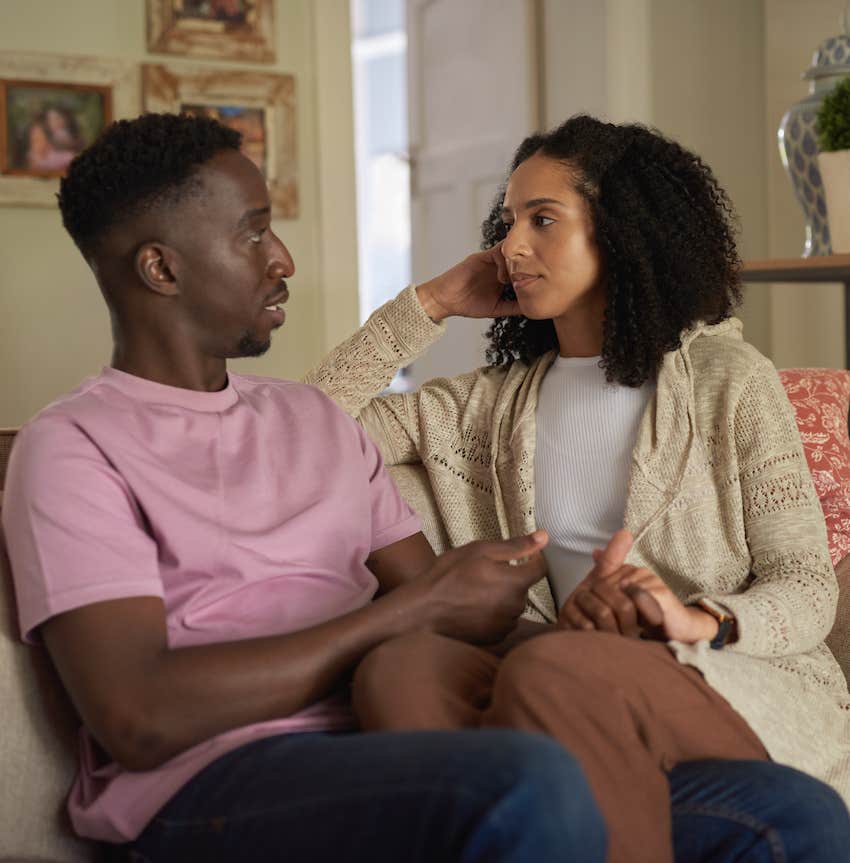The Most Common Fight That Destroys Relationships
The bad habit that slowly erodes trust and connection.
 Katerina Holmes | Canva
Katerina Holmes | Canva “He said, she said” has many meanings in today’s world. It plays a huge, and often unfair, role in dismissing claims of maltreatment. But this term can also refer to a style of disagreement that creates unpleasant exchanges (with little-to-no resolution), even in the best of relationships.
Of course, not all relationships are "he" and "she" — so please know that when we reference he said/she said, we simply mean that it's one person's word against another's.
Here's how you can avoid the common fight style that destroys relationships
1. Stop talking if you are heading in the wrong direction
As soon as you recognize the conversation is headed the wrong way, stop talking. If you realize you made a wrong turn on the road, you won’t keep driving away from where you’re trying to go. The same behavior makes no more sense in a conversation.
2. Deal with what you feel
Once you are no longer headed in the wrong direction, deal with the feelings that have been stirred up. What you understood your partner to say, the tone they used, or their facial expression/body language created a reaction.
Do you feel hurt, embarrassed, belittled, shamed, afraid, frustrated or vulnerable? If you feel anger, there is probably another emotion at the core that is more relevant.
3. Think through possible interpretations
The emotion you feel is the foundation for the story you are telling yourself about what’s happening. It is the filter that determines what you pay attention to and remember. It is a reflection of what matters to you. But, it is only one possible interpretation.
What might some other ones be? When you can identify some, you have the option of choosing a different one. This gives you a way out of the "he said, she said" straight jacket.
 Prostock-studio via Shutterstock
Prostock-studio via Shutterstock
4. Know how perception is reality
That isn’t to say that there is no such thing as a verifiable fact. But without a completely objective measure, like an audio or video recording, it is impossible to establish. Unfortunately, many people, maybe even you, expend a tremendous amount of energy and emotion battling someone else’s perception.
I cannot tell you how often one person relating an event to me is interrupted by their partner with, “That’s not what happened!" or, "I didn’t say that.” The first person reiterates their recollection, their partner denies it again — continuing the "he said, she said" opposition — and things continue to spiral out of control unless I step in.
While that works in my office unless the couple understands the "he said, she said" approach is always an exercise in futility, they will keep getting caught up in this unresolvable loop of seeking to be right — never getting to the heart of the issue and continuing to feel unheard and invalidated.
5. Realize you never experience an event or conversation the same way as another person
More to the point, you will never really convince them they didn’t experience it the way they believe they did. There is always your version and their version of what happened. The objective fact is somewhere in the middle but, for all useful purposes, that doesn’t matter.
So how do you stop this power struggle associated with "he said, she said" inconsistencies? Drop your end of the rope. Once you stop pulling against your partner, they will stop pulling against you. Then, and only then, can you have a real conversation.
6. Determine what is going on
You heard what you heard and experienced what you experienced. You don’t have to justify or defend it, but you do need to understand it is subjective.
It is filtered through the lens of your physical, mental, and emotional state in the moment and your past experiences, both with this person and everyone else you’ve encountered in your life.
 mavo via Shutterstock
mavo via Shutterstock
7. Is what you hear what they said or meant
That doesn’t mean you didn’t hear it that way. It is what you experienced. The question then becomes, now what? Without any more information, you will take action on what you believe occurred. And, therein, lies the road to ruin, or at least an argument.
But when you get sidetracked — by what was or wasn’t said, the tone it was or wasn’t said in, what was meant or not meant — you lose control of the situation and, often, of yourself. You’re convinced you’re “right." Your partner is convinced they are. Neither of you will give ground, so it turns into a loss for you, a loss for them, and ultimately, a big loss for your relationship.
A secondary, but no less important, question to ask is, “Why is it so important to be right?” If you are “right”, then your partner is automatically “wrong”. If you can have different perspectives, both of you can be “right." This stops the argument over what happened and allows you to move into the process of finding a resolution.
Lesli Doares is a therapist, coach and the founder of Foundations Coaching, a practical alternative for couples worldwide looking to improve their marriage without traditional therapy.

